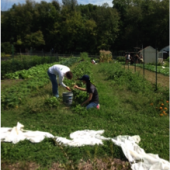
Abstract: Campus agriculture projects are increasingly being recognized as spaces impactful to student engagement and learning through curricular and co-curricular programming; however, most campus farm activities are limited to agriculture or sustainability programs and/or co-curricular student clubs. Thus, campus farms are largely underutilized in the undergraduate curriculum, marking a need to explore the efficacy and impact of engaging a diverse array of disciplinary courses in the rich social, environmental, and civic context of local sustainable agriculture. The Farm Hub program presented here incentivizes instructors to refocus a portion of existing course content around the topic of local, sustainable agriculture, and reduces barriers to using a campus farm as a situated learning context for curricula. A pedagogical framework founded in place-based experiential learning (PBEL) theory was developed to guide instructors in the development and implementation of 4–6-week inquiry-based PBEL modules embedded in existing courses. The framework was converted into a research protocol to quantify program implementation fidelity and PBEL best practice adherence for the proposed lesson plans (intended) and their implementation (applied). The framework enables the development of a cohesive cross-curricular program so that the impact of implementation fidelity and best practice adherence to student learning outcomes in scientific literacy, place attachment and meaning, and civic mindedness can be assessed and the results utilized to develop a formal farm-situated PBEL pedagogical taxonomy. This framework can be applied to PBEL curriculum in natural spaces beyond campus farms.
Continue ReadingWe present a non-formal learning experience between Kean University students and Groundwork Elizabeth that draws upon the ecologically renewing and civically engaging mission of renewable agriculture. Under increasing urbanization pressure in the New York Metropolitan Area, Groundwork Elizabeth emerged as a nonprofit organization dedicated to address challenges of food security and environmental degradation. During the spring of 2015, 17 students in the School of Environmental and Sustainability Sciences at Kean University created a plan for the design and management of the Liberty Hall Farm, which Groundwork Elizabeth manages. The capstone students worked on six projects that were proposed by the Groundwork Elizabeth: 1) permaculture design, 2) water management, 3) soil management, 4) a medicinal plant garden design and implementation, 5) an online farm records tracking system, and 6) education curricula for primary and secondary schools visiting the farm. A summary of these actions and the project outcomes are presented.
Continue Reading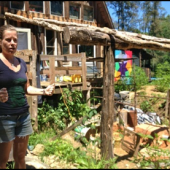
Place can be understood as space endowed with meaning, evoking notions of difference, connection, attachment, and emotion. As processes of modernity and globalization have increasingly homogenized cultural and natural landscapes, place is said to be ‘thinning’ or lost, linked to widening rifts between social and natural worlds. Such homogenization globally has sparked concerns, as people perceive landscape loss and increasing socio-ecological injustices. One such system of homogenization and unsustainability is industrial agriculture, a system that has shifted smaller scale, place-based, and diverse food systems to a global, mechanized one, distancing production from consumption, disrupting communities, and obscuring awareness, understanding, and care.
Yet, as consumer awareness increases and people desire to know where their food comes from and who produced it, inclusive place-based food systems can provide reconnections amongst producers, consumers, community, and the more-than-human world. In this paper, stemming from research in western North Carolina, we bring together literature from scholars of place, agro-food studies, education, and tourism to investigate the role of place in local food systems as well as the potential of small-scale sustainable agricultural places to serve as important educational spaces via community-based farm tourism. To better understand such potential, we draw on a study of the Blue Ridge Women in Agriculture High Country Farm Tour, an annual tour of small-scale sustainable working farms in the North Carolina High Country. Delving into participating producers’ philosophies, practices, and stories reveals passionate sustainable producers firmly rooted in place, while exploring consumer motivations for and impacts of participation makes a strong case for community-based farm tourism and other environmental tourism projects as an avenue for place-based education, community socio-ecological resilience, and sustainability across scales.
Continue Reading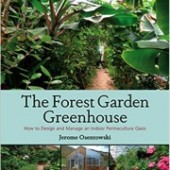
Abstract: Book review of The Forest Garden Greenhouse by Jerome Osentowski.
Continue Reading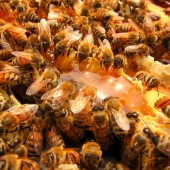
The Ashland Apiary Project is a multi-pronged, multi-aged learning design that uses beekeeping as a thematic avenue for hands-on experiential learning and the cultivation of land stewardship. The project is a student-led, collaborative effort by Southern Oregon University to establish an on-campus apiary that serves as a model of place-based and community-based education for a wide audience of students in an elementary, secondary, and collegiate setting. Through the Ashland Apiary Project, the pedagogic approach of “apiary-based learning” is considered in the field of sustainability education.
Continue Reading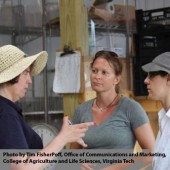
There is evidence that the American agrifood system is a significant contributor to environmental, economic, social, and ethical-animal welfare damage to the earth and to society and is unsustainable, yet the worldview of a substantial percentage of the population conflicts with this assessment. A significant number of researchers, non-governmental organizations, and government entities assert that the detrimental effects of industrial agriculture must be addressed without delay and sustainable agricultural practices implemented. Attempting to change a worldview is not an easy task. A growing body of research in other disciplinary areas suggests that storytelling can serve as an effective method of fostering change. This mixed-methods study examines the role of storytelling in effecting positive change in worldview and attitudes toward sustainable agriculture. The study explores the effects of Story-based versus Information-based treatments on such change. The hypothesis of the study is that Story-based treatments will be more effective in promoting positive change than will Information-based treatments. The findings of the study provide evidence supporting this hypothesis. The story characteristics found to be associated with positive change included: first-hand personal view, vivid description, and identification with the story narrator.
Continue Reading